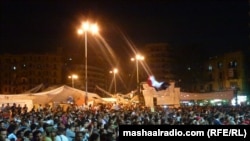The freedom of assembly is recognized as a worldwide human right by the United Nations Universal Declaration of Human Rights. In the words of the Head of the U.S. Delegation to the Organization for Security and Cooperation in Europe’s (OSCE) 2013 Human Dimension Implementation Meeting, Ambassador Robert Bradtke, “Respect by states of the fundamental freedom of assembly is a core characteristic of a free and open society and of accountable, democratic government.“
This freedom should not be restricted or banned unless exercise of the freedom represents incitement to imminent violence. However, as Ambassador Bradtke explained, “Unfortunately, in many (OSCE) participating States, authorities routinely impede the exercise of freedom of peaceful assembly for political purposes.”
So, for example, the government of Turkmenistan does not allow unregistered organizations to hold demonstrations. And by not granting permits for public meetings and demonstrations, it effectively undermines freedom of peaceful assembly and represses dissent.
In Belarus, political activists attempting to assemble peacefully are subject to preventive detentions and other measures. Here, too, requests for permission to hold demonstrations are routinely denied.
Tajikistan increased the penalty for organizing or participating in “unapproved gatherings, meetings, demonstrations, pickets and street processions” to up to five years in prison, while Kazakhstan requires that applications for public gatherings be submitted 10 days in advance. The application process is onerous, making organizing public meetings and demonstrations difficult, even impossible.
In the Russian Federation, the continuing prosecutions of the May 6th demonstrators, who protested the third presidential inauguration of Vladimir Putin, have discouraged others from exercising their rights to assemble peacefully and to protest. Also, the ban on Lesbian, Gay, Bisexual and Transgender, or LGBT, so-called “propaganda” to minors has chilled public assembly by LGBT persons and their supporters.
In Turkey, police used excessive force against peaceful, law-abiding, citizens exercising their rights to protest.
Azerbaijan’s Parliament has greatly increase fines on participants in and organizers of unauthorized protests. The Serbian government, for the third year in a row, acquiesced to threats of violence in calling off a long-planned LGBT Pride Parade, but to their credit, the Moldovan and Czech governments allowed their citizens to demonstrate peacefully, stepping in only if the crowd turned unruly.
“Citizens gathering and expressing themselves peacefully is a hallmark of democracy,” said Ambassador Bradtke. “States have an obligation not only to permit assembly, but a responsibility to protect peaceful assemblies from attacks by others.”
This freedom should not be restricted or banned unless exercise of the freedom represents incitement to imminent violence. However, as Ambassador Bradtke explained, “Unfortunately, in many (OSCE) participating States, authorities routinely impede the exercise of freedom of peaceful assembly for political purposes.”
So, for example, the government of Turkmenistan does not allow unregistered organizations to hold demonstrations. And by not granting permits for public meetings and demonstrations, it effectively undermines freedom of peaceful assembly and represses dissent.
In Belarus, political activists attempting to assemble peacefully are subject to preventive detentions and other measures. Here, too, requests for permission to hold demonstrations are routinely denied.
Tajikistan increased the penalty for organizing or participating in “unapproved gatherings, meetings, demonstrations, pickets and street processions” to up to five years in prison, while Kazakhstan requires that applications for public gatherings be submitted 10 days in advance. The application process is onerous, making organizing public meetings and demonstrations difficult, even impossible.
In the Russian Federation, the continuing prosecutions of the May 6th demonstrators, who protested the third presidential inauguration of Vladimir Putin, have discouraged others from exercising their rights to assemble peacefully and to protest. Also, the ban on Lesbian, Gay, Bisexual and Transgender, or LGBT, so-called “propaganda” to minors has chilled public assembly by LGBT persons and their supporters.
In Turkey, police used excessive force against peaceful, law-abiding, citizens exercising their rights to protest.
Azerbaijan’s Parliament has greatly increase fines on participants in and organizers of unauthorized protests. The Serbian government, for the third year in a row, acquiesced to threats of violence in calling off a long-planned LGBT Pride Parade, but to their credit, the Moldovan and Czech governments allowed their citizens to demonstrate peacefully, stepping in only if the crowd turned unruly.
“Citizens gathering and expressing themselves peacefully is a hallmark of democracy,” said Ambassador Bradtke. “States have an obligation not only to permit assembly, but a responsibility to protect peaceful assemblies from attacks by others.”






